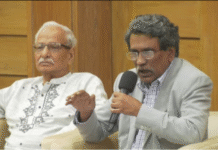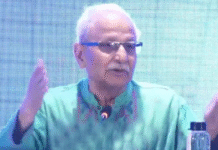
A fresh wave of violence forcing displacement of Rohingya people in Rakhine is a cause for concern for Bangladesh as the country failed to repatriate the Rohingyas who came here in 2017 and before.
The decline in international aid and the birth of 30,000 babies a year at the Rohingya camps in Cox’s Bazar is also putting to test Bangladesh’s ability to manage the camps where criminal activities are common.
“The reports of fresh displacement of Rohingyas and their attempts to enter Bangladesh are worrisome. Several hundred Rohingya people entered Bangladesh over the last weeks,” said a foreign ministry official.
“Our border guards are careful. They are preventing attempts by Rohingyas to enter Bangladesh,” the official added, requesting anonymity.
Bangladesh maintains that sustainable repatriation of the Rohingya people is the only solution. At least 1,000 Rohingyas were set to return to Myanmar in November last year. The initiative failed as new conflicts erupted in Rakhine state, the official added.
Two earlier attempts at repatriation also failed.
After Myanmar launched a violent military crackdown in Rakhine on August 25, 2017, about 750,000 Rohingya people entered Bangladesh.
The Gambia later filed a genocide case against Myanmar with the International Court of Justice, and the International Criminal Court is investigating the human rights violation. The UN adopted several resolutions.
But the Rohingya people did not agree to return, saying the condition in Rakhine was not safe, even though the rebel group Arakan Army and Myanmar military signed a ceasefire in October last year.
After November, AA engaged in renewed clashes with the junta and took control of the vast majority of Rakhine State. Over 320,000 people were displaced in Rakhine and Chin states.
Human Rights Watch said in recent months, the Myanmar military and the ethnic Arakan Army have committed mass killings and arson attacks against Rohingya communities.
On August 5, nearly 200 people were reportedly killed by drone strikes and shelling on civilians fleeing fighting in Maungdaw town, according to Rohingya witnesses. About 630,000 Rohingya remain in Myanmar.
“Rohingya in Rakhine State are enduring abuses tragically reminiscent of the military atrocities in 2017,” said Elaine Pearson, Asia director at Human Rights Watch in a statement on August 21.
Prof Sk Tawfique M Haque, director at the South Asian Institute of Policy and Governance at North South University, said the AA once was soft on the Rohingyas, but now the rebel group is not happy with them.
The reality in Rakhine suggests that the AA will be eventually taking full control of the state. In that case, Bangladesh needs to make contact with AA through a backchannel, while the diplomatic relations with whoever is in the central control should continue, he told The Daily Star yesterday.
“We don’t see any scope in the near future of Rohingya repatriation. However, the current interim government is well accepted, especially in the western world. This can also be an opportunity to pressurise the AA,” Prof Tawfique said.
Meanwhile, in a meeting in Thailand last week, Chinese Foreign Minister Wang Yi said China supports a democratic transition in Myanmar and backs a regional plan to find a way out of the ongoing crisis in the Southeast Asian country.
Bangladesh needs to closely follow the developments relating to Myanmar. If Bangladesh can include the issue in the regional or global level negotiations, a solution may be found, Prof Tawfique said.
Providing humanitarian aid to the one million Rohingya in the camps is challenging to Bangladesh because of the dwindling supply of funds and Bangladesh’s economic state.
This year, around $852 million is needed for humanitarian aid at the camps. So far, less than 40 percent of the sum has come through.
“Managing the increasing number of Rohingya will be a real challenge with declining funding. The international community must understand the multiple challenges Bangladesh faces today and extend their hand,” Tawfique said.
“The rapidly escalating conflict in Myanmar is all the more reason for the United Nations Security Council to finally refer the situation in the country to the International Criminal Court. There can be no progress without accountability,” Amnesty International’s Myanmar Researcher Joe Freeman said in a statement.
“The future of Myanmar hinges on protecting, promoting and upholding the human rights of all people in the country.”
Daily Star









